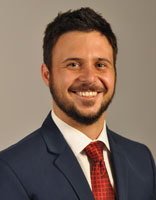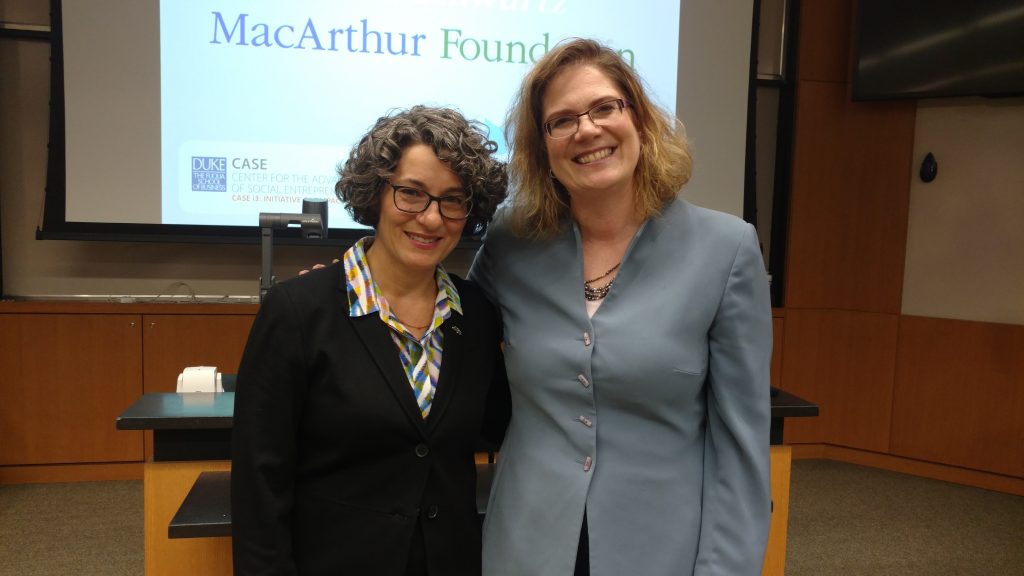
This post was written by Zen Dedekind, CASE i3 Fellow and Co-Chair, in December 2016. Debra Schwartz, Managing Director of MacArthur Foundation, came to the Fuqua School of Business as part of the CASE Executive Speaker Series.
Impact Investing is an evolving industry, considered by some to be new and by others to be older, but better defined in recent times. Everyone agrees that the industry is growing rapidly. A crucial catalyst for this growth has been foundations, organizations that provide a type of capital that other players cannot. Foundations are flexible, taking on more risk over a longer time period and having different return considerations. As the industry changes, will the role of foundations change? Now that more private players are entering the market are foundations still valuable?
With these questions, Debra Schwartz, Managing Director of the MacArthur Foundation, kicked off her talk during a recent CASE Executive Speaker Series talk in December. MacArthur is one of the largest foundations in the United States. The foundation “supports creative people, effective institutions, and influential networks building a more just, verdant, and peaceful world.” As the head of MacArthur’s $300 million PRI department, Debra has been involved with impact investing for over 15 years, twice as long as the term “impact investing” has been coined. This time horizon provides Debra a unique perspective in a newly defined industry: the ability to take the long view on what MacArthur has accomplished, what they aim to achieve, and what their role will be in the future.

What MacArthur has accomplished
When you hear about major players in the impact investing space, MacArthur’s name often comes up. This is understandable considering that Bill Drayton, one of the early MacArthur Fellows (affectionately referred to as “genius grants” in popular media), devised the term “social entrepreneur.” Another MacArthur Fellow, Durham’s own Martin Eakes, started Self-Help Credit Union with an impact investment from MacArthur. This investment “illustrates all the ways in which the right kind of capital, in the right form, at the right time in an organization’s growth can really be influential.” Other organizations supported by MacArthur include SJF Ventures, ACCION, TechnoServe, PATH, Enterprise Community Partners and dozens of other CDFIs.
In addition to supporting organizations, MacArthur also plays a more direct role in “mobilizing investments and bridging capital gaps though guarantees, first- or shared-loss positions, and other mechanisms.” This is an important component of “blended finance,” the practice of stacking capital from various contributors with different return preferences and risk tolerance. This allows these diverse players to all work together effectively on the same transactions.
What MacArthur aims to achieve
MacArthur plans to “build bridges, not only over the capital gaps that currently exist but within markets at large. To provide both investors and social enterprises greater ease and efficiency when they seek to connect”. Debra thinks it is important to do two things during the next phase of impact investing at MacArthur. The first is to syndicate. This “brings some of the efficiency of the regular capital markets to the deep end of the impact investing pool” and enables other foundations and organizations to participate in investments that others have originated. The second is to allow foundations, who have the teams and the capability available, to act more like intermediaries, as opposed to only co-investors or guarantors. Leveraging the platforms these foundations have created to make them more accessible to others. MacArthur has already started this process with their Benefit Chicago initiative.
The role of foundations going forward
Debra believes that impact investing is here to stay but that many of the issues currently plaguing the industry will not be solved overnight. There is a multitude of different players with different risk appetites, return requirements, and impact motivations. The investment instruments are new and not currently well understood by the market. Solving these problems will not be easy.
“Technology, knowledge sharing and impact measurement all can help, but at the end of the day, the work of investing in social enterprise … is custom and high touch.” “Solutions are made, not found, ” and the industry needs players who are willing to take a long view to achieve results.
Foundations can take this long view because they own their capital. They are unique in their ability to make mission focused, patient investments. This was essential in getting the impact investing industry to where it is today but their role is not over. “Foundations are now more important than ever, as stewards of authentic impact and as catalysts for risk-taking and innovation” they help bring private and public investors into the mix.
Debra’s comments highlight how diverse industry participants are and how important it is that current players, and students entering the field, understand how to communicate and ultimately integrate with one another. It is clear that foundations such as MacArthur still have an important role to play in the evolving world of impact investing.

